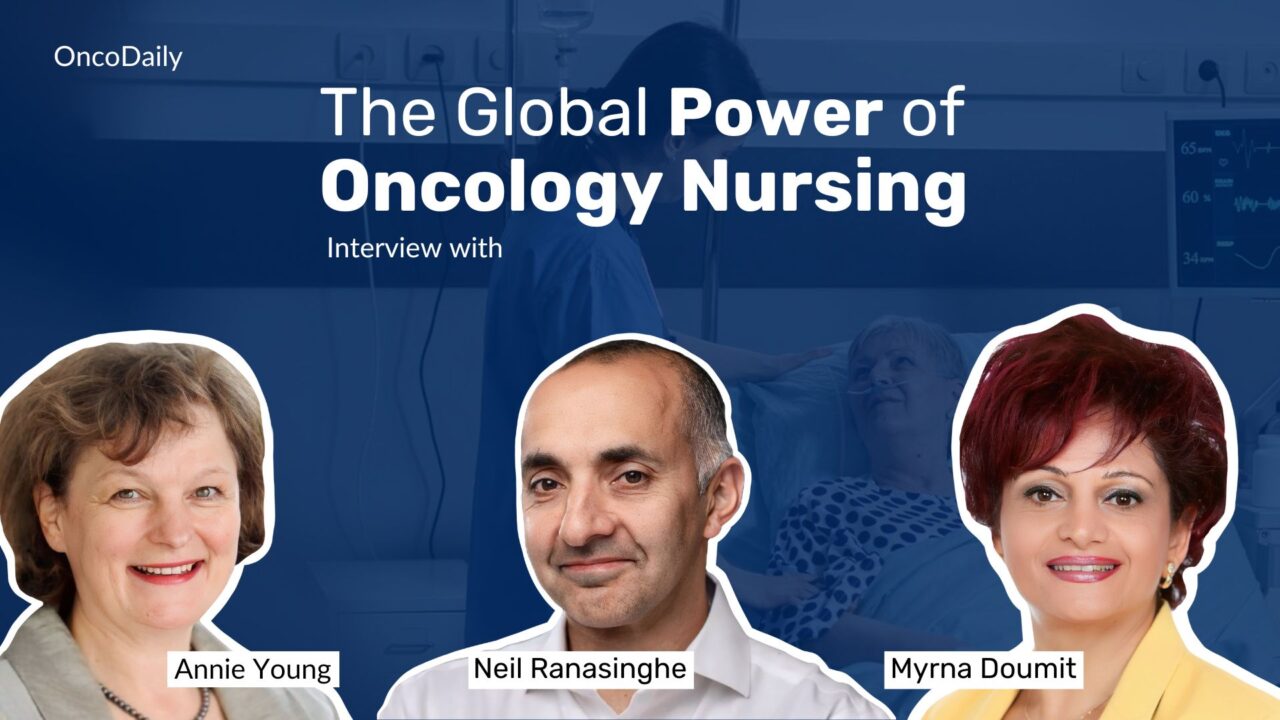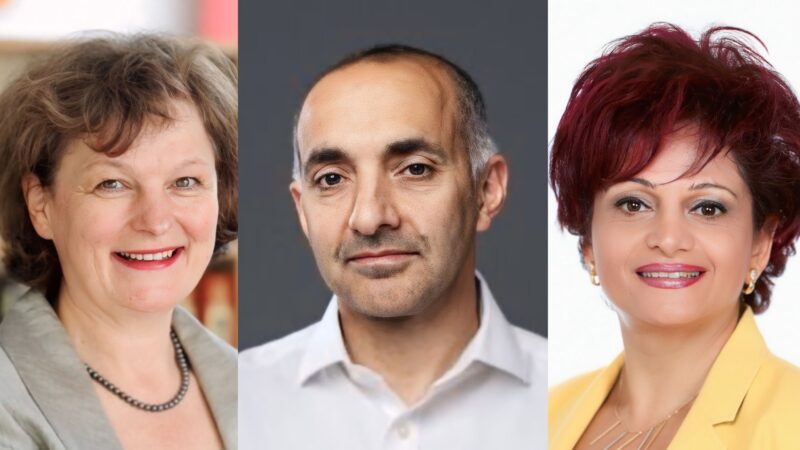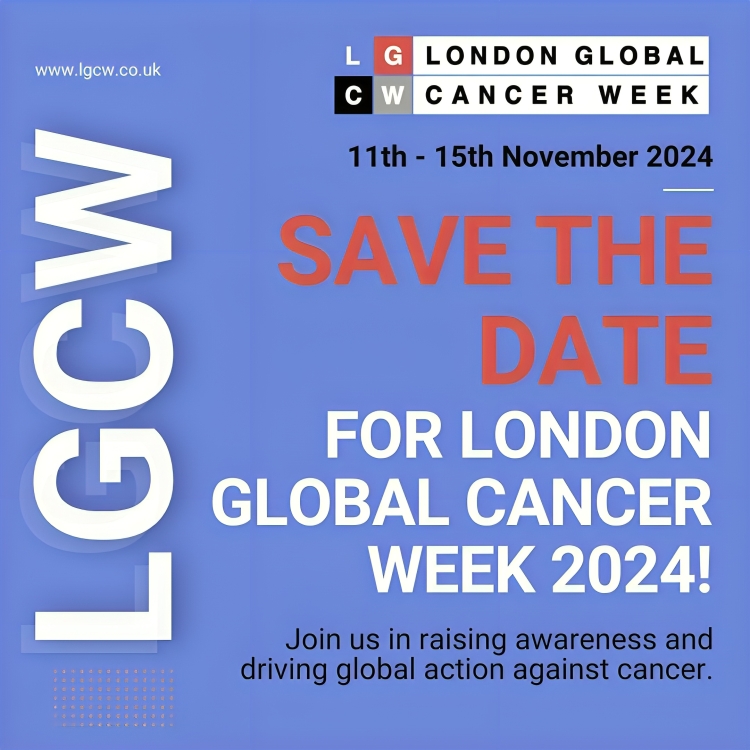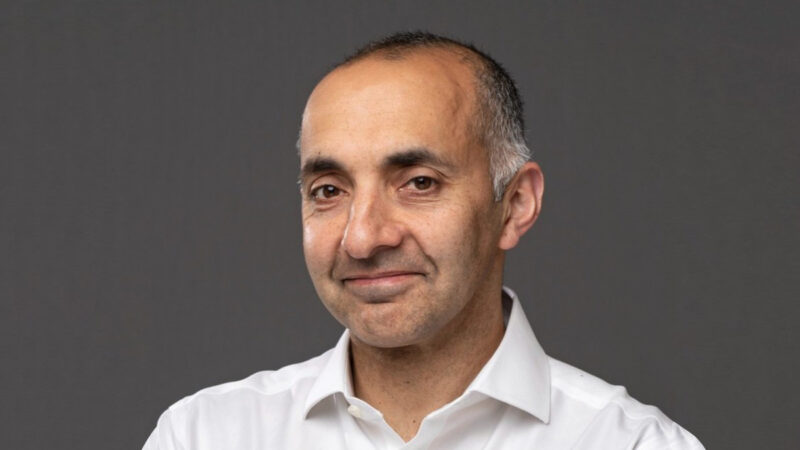
The Global Power of Oncology Nursing (GPON) – Neil Ranasinghe’s chat with Myrna Doumit and Annie Young
“We speak the language of nurses, for nurses, by nurses”
In the first series of OncoDaily Articles, Prof. Myrna Doumit from the American University of Beirut, Lebanon, and Prof. Annie Young from the University of Warwick, England, speak to Neil Ranasinghe about how the Global Power of Oncology Nursing (GPON) movement is helping oncology nurses across the globe, and how it positively impacts patients and their families.

Neil: Myrna, how would you describe yourself and tell me about the Global Power of Oncology Nursing (GPON)?
Myrna: Why me and why GPON? Because I’m a Professor at the American University of Beirut (AUB). I’m an oncology nurse. I do my research with nurses, for nurses, with patients, for patients.
I do my research with nurses, for nurses, with patients, for patients.
Myrna: I’m a qualitative researcher. I study the lived experience of patients, and nurses because we know a positive relationship with nurses can be beneficial to the quality of care.
Global Power of Oncology Nursing (GPON) is a movement. It’s a large network of nurses from high resource and low resource countries who come together to benefit from each other. It’s a win-win because the nurses from high resource countries are sharing the knowledge, the expertise, and nurses from low resource countries are sharing the knowledge.
One example of this is due to the migration of nurses from low resource countries to high resource countries, the nurses in high resource countries better understand the needs of those nurses and will help them to integrate better in the healthcare system.
GPON is a win-win
Myrna: You can see how this is a win-win. The impact of GPON reaches many more nurses than the members of GPON; we run a free virtual conference annually as part of London Global Cancer Week. We invite all nurses across the globe to attend online, and to listen to other nurses mostly from low resource countries.
We speak the language of nurses, for nurses, by nurses
We speak the language of nurses, for nurses, by nurses and by people who were really positively affected by the care of nurses, because we know the important role that oncology nurses are playing. Without nurses, we don’t have hospitals, we don’t have care.
Without nurses, we don’t have hospitals, we don’t have care
Myrna: I want to ask you a question. You said that you are the father of a girl that had a leukaemia when she was three years old. Everyone was taking care of your girl. But did anyone approach you and ask you about yourself?
Neil: you were living the disease without having it
Myrna: Because you were living the disease without having it. You were hiding your feelings. And I can feel now that you still have emotions, feelings that are untouched that are bothering you. And this is why you’re doing this job. Did anyone approach you? No, but in in my country, this is the kind of study that I do because when I went and interviewed patients having palliative care, I went to that home and the family members were waiting for me at the door, asking me about the research I was doing. “What about us?”
Neil: Yes, there was a lot of care shown to my wife and I by the clinicians treating my daughter, but there was nothing systematic to look after us.
Neil: Annie can you tell me about your career, to date?
Annie: I’m an oncology nurse by trade for well over 30 years, coming up through a chemotherapy nurse and research nurse route. I’ve recently semi-retired and now focus on global oncology nursing. Supportive care research, mentoring, teaching, and learning from nurses in low resource settings fills my working days.
The learning and experience is two-way
Annie: Throughout all my jobs, I have had the privilege of travelling to low resource countries to listen and learn together from each other – as Myrna says, the learning and experience is two-way. I can’t emphasise enough, we in ‘the West’ learn so much from nurses who do so much good for people with cancer with such little resource.
Neil: What is a Research Nurse?
Annie: In the 1990s, being one of the first oncology research nurses was a huge opportunity for me, not only to offer people with cancer novel therapies, but also to conduct additional research; the qualitative element of patient experience or indeed, involving patients in the research was then missing from quantitative clinical trials.
Then and now, an oncology research nurse post is a great platform to learn about many aspects of the research process including governance.
Research nursing has transformed over the years. We now work in teams; people with cancer, nurses, health researchers, physiotherapists, statisticians, doctors etc. etc. Supportive care research involves the whole team.
Neil: How does this fit in with patient and public involvement (PPI)?
Annie: PPI is vital for effective research. We cannot do research without PPI. When you’ve had the experience of cancer, you know the ropes and can contribute to the design and implementation of the research – from initiation to completion. Equity, diversity and inclusion are also all important in research; strategies for incorporating the E, the D and the I into research make the findings impactful and relevant to the population studies.
Neil: Tell us about how GPON began and what its mission is
Myrna: GPON stemmed from London Global Cancer Week in 2020, the International Year of the Nurse and Midwife. We had a whole day and evening webinar to hear the voices of oncology nurses from low resource countries. On a day-to-day basis, we communicate mainly through WhatsApp and email. It’s much more of a movement and network than a formal organisation.
Annie: Our annual GPON webinars are over several time zones and split into the ‘East’ and ‘West’ sessions, and free and easy to join. We have some nurses on the GPON Steering Committee who are multilingual. We can communicate in Spanish and Arabic and choose one language from a low resource country to use zoom translate for the East webinar- this year it is Georgian where there is a huge need for nurse learning and camaraderie.
Our ‘West’ webinar is simultaneously translated into English or Spanish, depending on the speaker. We strive to engage as many nurses as possible around the globe, responding to what GPON nurses are telling us, not just about challenges because there are so many. It’s also about successes and opportunities.
The global nursing community speaks to us, we listen and we act
Annie: The global nursing community speak to us, we listen and we act. We are fortunate to grant annual awards for personal and team successes in lower resource countries. GPON is truly diverse. Equity, diversity and inclusion (EDI) are founding principles of GPON. EDI is not a tick box exercise; it is real and it’s how to fully embrace EDI in oncology nursing that GPON aspires to.
Neil: Can we talk about migration regarding nurses?
Myrna: As an individual, as a nurse, you bring with you your culture, your attitudes, your language, your knowledge that you have gained in your own country where you have usually trained. Cultures differ. GPON strives to understand different cultures.
GPON offers the opportunity to discuss, debate the pros and cons of migration, and for the nurses from the high resource countries to say, “this is how they think; can we improve their integration into our health system?”
Although the WHO and the International Council of Nurses (ICN) sometimes portray the negative impact of nurse migration on the healthcare system, GPON is a venue where nurses without any restriction, are given the platform to talk about their experiences, their education, their training, the positive (e.g. for nurses who have migrated, putting money back into their home and country economy) and the negative (e.g. sorely depleting the nursing workforce in those countries who can least afford to lose nurses). You can only understand this by talking; GPON encourages talking – from nurse migration to precision medicine.
Neil: Annie how has your experience of working abroad shaped how you do things?
Anne: I’ll give you one example of that, and this is family structure and caring in many low resource countries I have worked in, culturally different from the UK. Family is often everything to many cultures; the extended family physically and emotionally caring for their loved ones with cancer is frequently the norm in low resource countries. We can learn so much from all caregivers at GPON webinars.
The nurses and the families of people with cancer tell us how important it is to have the family trained in practical care, and to look after their loved ones and themselves. I have learned how we can adapt their practices to better listen to caregivers, support them to meet the patients’ needs and have put this into practice in the UK.
The model of going out for a couple of weeks to a low resource country to ‘teach’, coming back, then going out again to ‘teach’ at the same place is a common model. In most cases, it doesn’t work that well – the nursing practice does not tend to change over time.
One preferable model is living and working in the low resource country. As Myrna said, understanding and respecting the culture is critical to joint teaching and learning on a practical level.
GPON has a wonderful nurse steering committee member, Julia Downing, who lived and worked in Uganda for over 20 years. Over this time, she jointly helped change so much including nurses’ ability to prescribe opioids. Patience and persistence are crucial with this model – it takes many years to shift practice and put into policy. We can’t all move abroad of course; however, technology has transformed how we work, e.g. with informal mentorship online, often turning into friendship.
Neil: How does GPON facilitate research?
Myrna: The structure of GPON is ‘horizontal’, we have an advisory group but we’re all the same level, there’s no hierarchy. GPON members are doing joint research in low resource countries. We start off with very simple reviews and then systematic reviews.
GPON is publishing huge amounts on global nursing leadership, inequalities and inequities, led by GPON co-founder, Julia Challinor.
We encourage nurses that have never published before, nor had the opportunity, to co-publish on the challenges and opportunities of oncology nursing in their countries – there may be no oncology nursing practice; this is still important to know.
As I said, caregivers are living the disease without having it. “We [caregivers] have needs. We have concerns. We have worries.” After the research findings, we did patient support, family support group and we were able really to support the family caregivers because in Lebanon we live in extended families. And if one family member is sick, the whole family would come and get involved.
So subconsciously, you would live the disease without having it, and you would have worries and concerns. We have Nurse Researcher Highlight from a nurse from a low resource country at our annual webinar.
Neil: Am I right in saying that GPON promotes and supports research done by nurses?
Annie: GPON is based on the on the needs and the requests from our colleagues in low resource countries, that’s our number one focus. And it begins with research training. That’s what many members ask for. We’ve got lots of research training in the West that is possible to adapt. We can put them in touch with the providers, and we try and help them with resources as well by applying for grants.
We may start the research process by helping with a scoping review, finding the evidence to lead to a culturally specific research question to continue with the research; the key is that we are working together. We are helping support research into nursing care in low resource countries.
For example, if we are conducting a qualitative study by interview, on nurse migration, we analyse what people affected by cancer, nurses and policy makers in different countries feel about nurse migration. In the vast majority of cases, the research that we do together is published.
Neil: Say for example, I’m a nurse in the Philippines and I’ve got an idea about how I might be able to help patients better. If I join GPON, will I be able to get training on how to do the research, and then do the research?
Annie: We don’t do the research training, we signpost to the courses but we also make sure they’re pursuing the right course and we take a great interest and support in what nurses and their local teams until completion, that is what to do with the research – GRIP – getting research into practice.
We don’t give fish, we teach people how to fish
Myrna: What GPON offers is similar to a mentorship for nurses, because you may have an idea, but this idea is not very clear. The GPON mentors will help the nurse to develop that idea into a research project.
We don’t tell nurses what to do, but we think aloud with them, so that they learn how to do it, and how to think about it, because we’re not there all the time, but they are, and we need to empower them. Some nurses have never spoken to other nurses from another country. They have never been on a platform where they can speak about their ideas.
The mere fact of inviting them to talk about their experience and their ideas is empowerment. And by empowering the nurses, we know that we are boosting their self-esteem.
Annie: We are trying to meet the nurses’ needs as much as possible. We encourage one or two nurses working in low resource countries to attend face to face meeting at London Global Cancer Week and facilitate this. The reception and support they get at LGCW, is first-rate.
We develop the leadership, the inquisitive mind, and nurses’ interest in research
Myrna: We do have some support from pharma and device companies but not much. GPON membership is free. We need financial support to help nurses come and attend events like London Global Cancer Week, paying for the visa, the hotel etc. We would love to have more nurses coming and meeting other nurses. The people and have this opportunity of attending international or regional conferences and posing questions. This is how we develop the leadership, the inquisitive mind, and their interest in research, it really helps nurses develop having been on that that platform, it really springs them on to other areas where requested and people hear the nurses and then contact them.
Neil: How global is GPON?
Annie: GPON is global and expanding every day We have nurses from Sudan, Palestine, Afghanistan -countries in conflict and many other parts of the world – in all six WHO regions. We keep in touch individually if they wish, to check they are safe.
Some GPON members may choose to get involved with private matters as well e.g. if the nurse’s biggest need is the education of their daughters who are banned from school education, we can again signpost or coordinate conversational English classes for the girls, run by interested friends; this is not nursing; the GPON family grows and grows. These friendships are wonderful, again a win-win situation.
After all the world has become like a village
Myrna: After all the world has become like a village. We speak to each other to support each other.
Neil: How does GPON fit in with other organisations?
Myrna: GPON is not in competition of any association that deals with oncology nursing. We are a bridge between the oncology nurses who are in low resource countries and nurses who are in high resource countries. We invite all oncology nurses to join GPON and join together.
With GPON you don’t need to belong to any association. You don’t need to pay. It’s a platform where you can discuss the problems that others may not see as issues.
Annie: It’s the only movement, the only network with both paediatric and adult oncology nurses. GPON is different from the WHO nursing community and the International Council of Nurses (ICN), they’re both truly fantastic. We are about oncology nursing and still part of the bigger picture, all nurses together.
Neil: Say for example, I’m a nurse in Sri Lanka, I don’t have time for research, I’m not going to leave Sri Lanka. Can GPON still help me?
Annie: For sure, most of GPON’s work is virtual and there are so many educational opportunities, every day these are being shared over WhatsApp. Free educational opportunities for hot topics of care in low resource countries.
We touch on the human, scientific individual, personal aspects
Myrna: We touch on the human, scientific individual, personal aspects. We are trying to meet the needs of oncology nurses; we’re trying to empower them by asking them to speak. To present their issues and we’re not trying to impose solutions, we’re trying to think with them, so that solutions come from them and their own culture. This is most important if we want sustainability.
Neil: Thank you Annie and Myrna for telling me about GPON. I would like to finish the interview on a lighter note, Myrna, what’s your superpower?
Myrna: My superpower is that I have this internal locus of control. I’m a persistent person. I follow up and do the things that I want to do. Living in Lebanon gave me this resilience. It’s not just something from a history book. I was born during the war. I grew up, I had children and still we are living in the war.
Neil: Since conducting this interview the conflict in the Middle East has spread to Lebanon with many casualties. I hope and pray the violence will stop.
Neil: Annie tell me something special you have done
Annie: I canoed down the River Zambezi in Zambia and crossed the Victoria Falls into Zimbabwe. It was the most wonderful experience. All these hippos underneath us and we were in this tiny boat rocked by the hippos. I came home and the very next day I watched a documentary on the television; many people had had their boats tipped over, and one or two attacked by hippos exactly where we had been. I’ll never, ever, ever do this again.
Neil: That sounds quite an experience. I enjoy kayaking but there aren’t hippos where I go in England!
Neil: And my last question, Annie please tell me about your favourite food
Annie: My favourite food is from a place outside Baalbek, in Lebanon. It is a café near the Roman ruins up in the hills. I’ve never tasted falafel wraps like these.
I’ve never, ever tasted falafel wraps like it
Annie: They were delicious – “can I have another? can I have another?”
Neil: I am a huge fan of falafels and wraps They sound amazing.
Neil: Thank you Annie and Myrna. I have learned a lot about the value of GPON. I hope you have enjoy reading about the great work being done. The GPON conference is on 12th November 2024 and it is free. Thank you to Sharon Dempsey and Julie Waxgiser for helping me with this article.

Find more information about the London Global Cancer Week 2024 at OncoCalendar
About Neil Ranasinghe
Neil Ranasinghe is a parent of a survivor of childhood cancer. Just over 20 years ago, his daughter had leukaemia when she was three years old. Since then Neil has been involved in various UK and global organisations advocating for children with cancer, this includes OncoDaily, SIOP, CCLG, CRUK, LGCW.
In the UK, Neil is involved with a group that reviews documentation given to parents when their child goes on a paediatric oncology clinical trial, this involves working on consent forms, assent forms and patient information sheets.

Read more articles featuring Neil Ranasinghe at OncoDaily
-
Challenging the Status Quo in Colorectal Cancer 2024
December 6-8, 2024
-
ESMO 2024 Congress
September 13-17, 2024
-
ASCO Annual Meeting
May 30 - June 4, 2024
-
Yvonne Award 2024
May 31, 2024
-
OncoThon 2024, Online
Feb. 15, 2024
-
Global Summit on War & Cancer 2023, Online
Dec. 14-16, 2023
